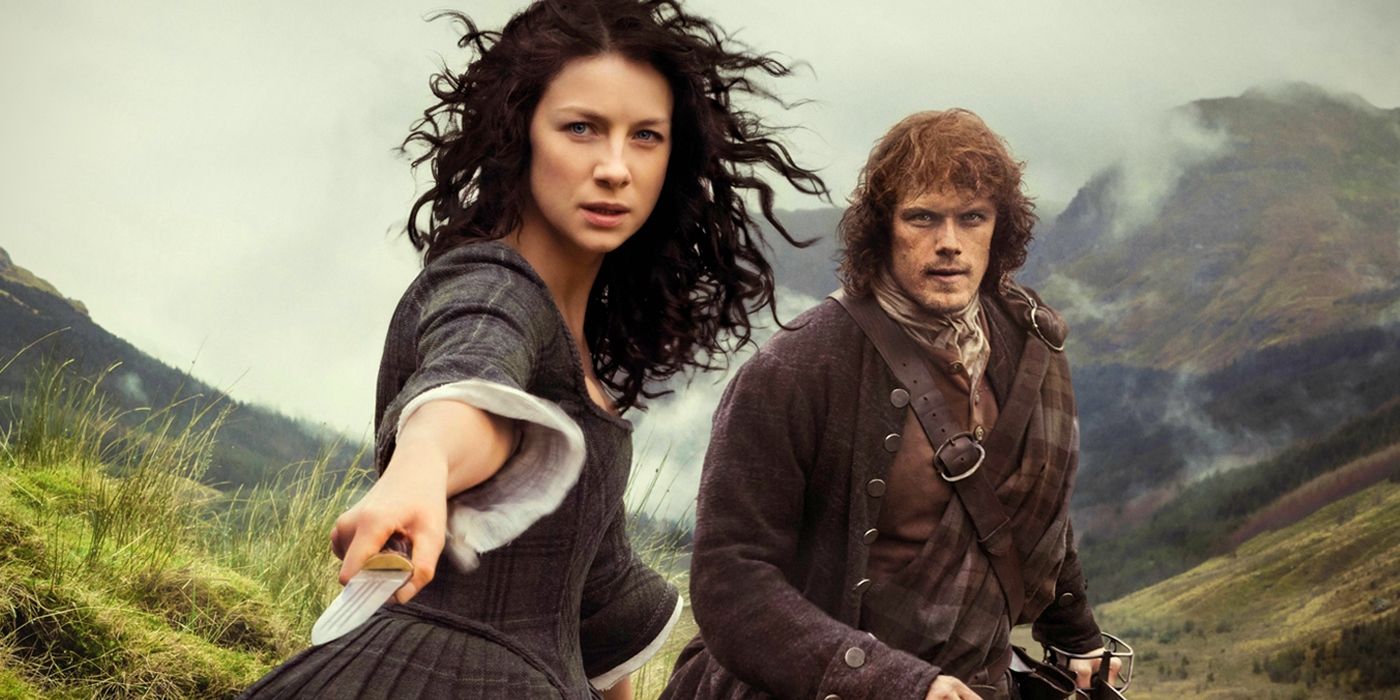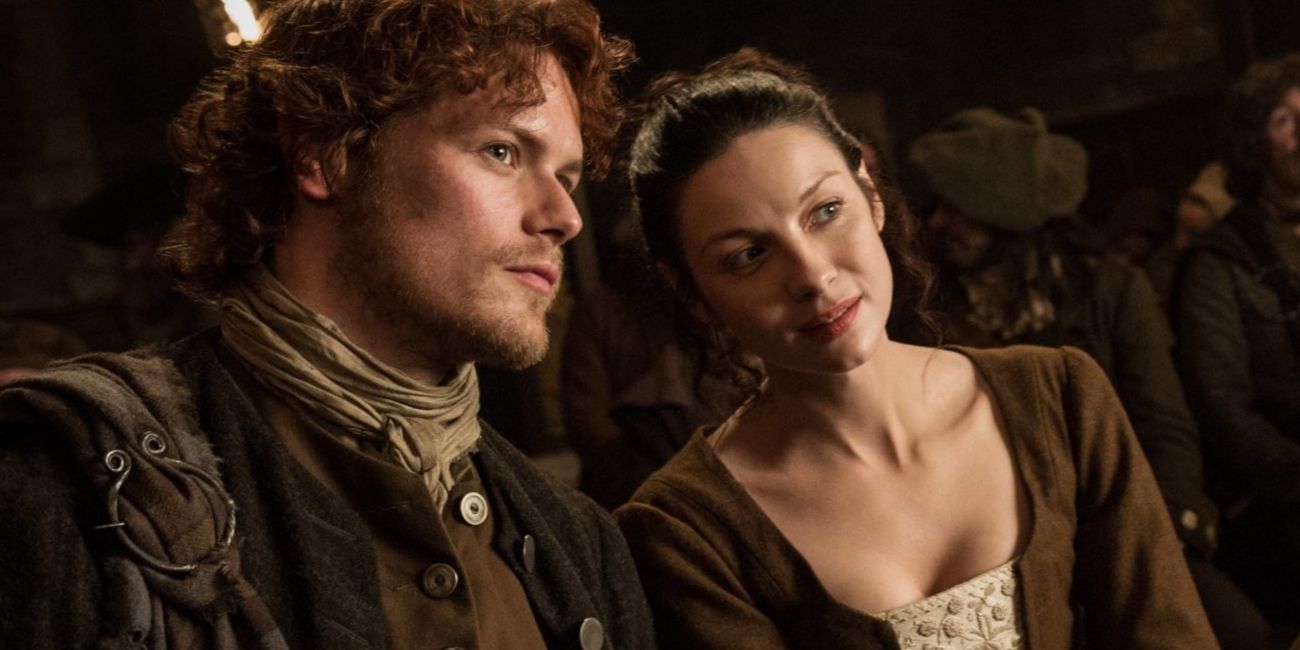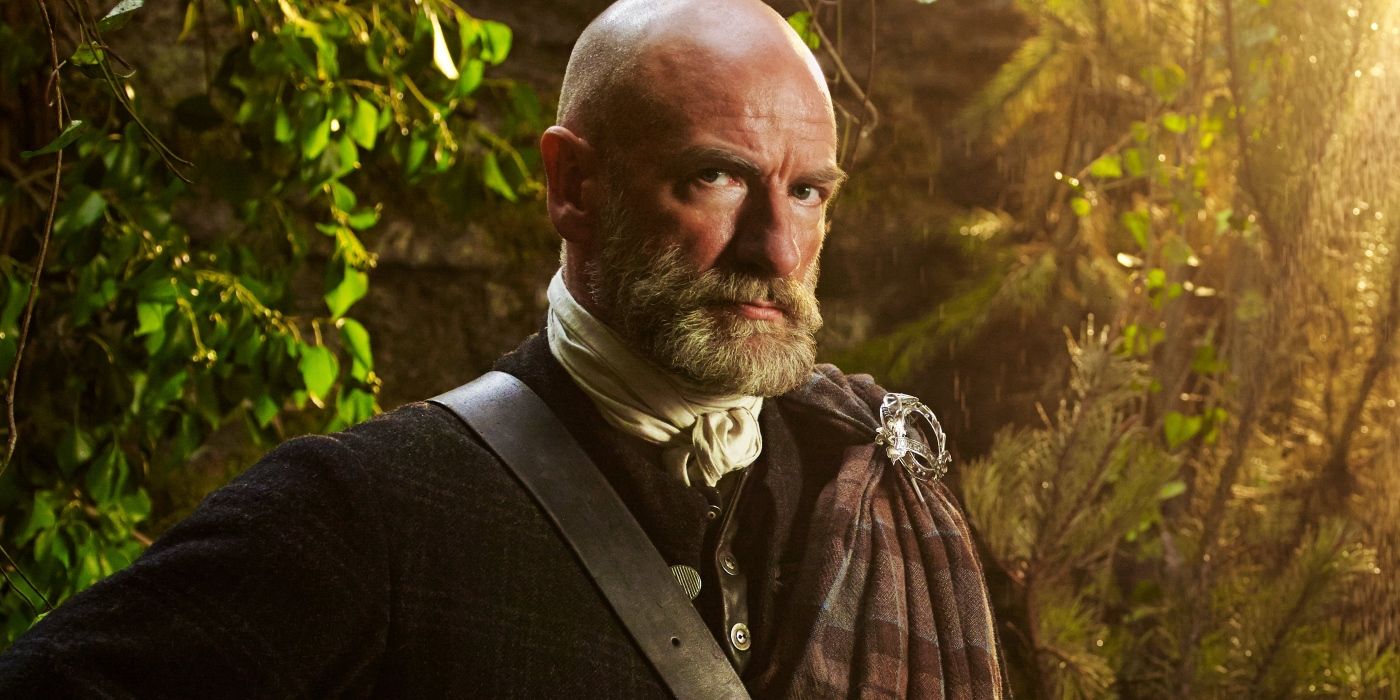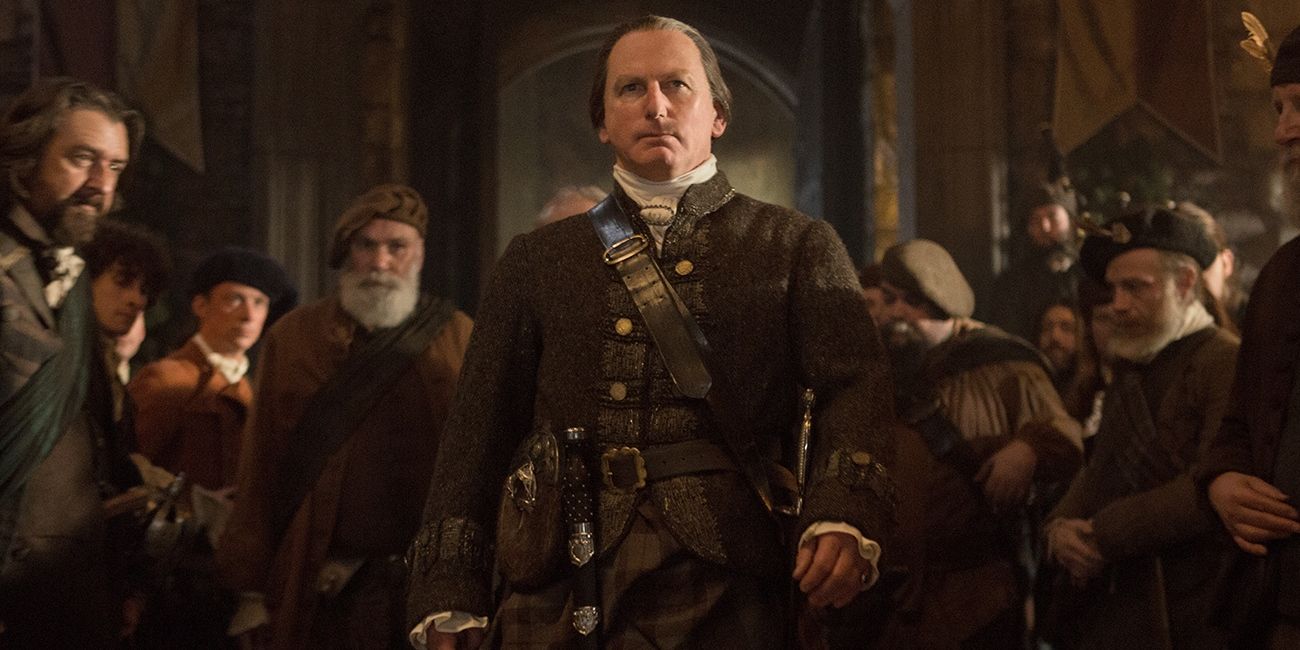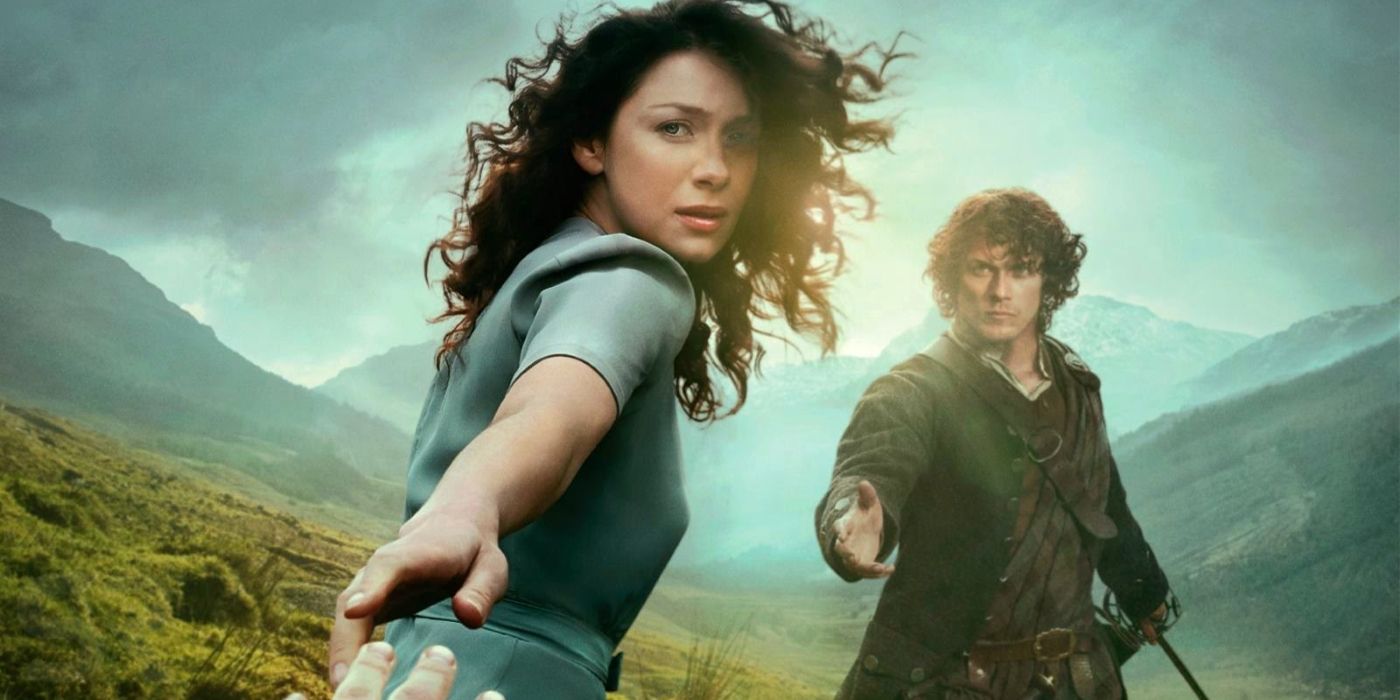Warning: Minor SPOILERS for Outlander Season 1
The Outlander series brings the world of 18th Century Scotland to life with startling accuracy... and that includes much of the language spoken, barely translated out of the Gaelic and Scottish slang. We're here to help fans learn the names, terms, and expressions they'll need to know.
With the STARZ series now available on Netflix, a whole new wave of viewers will be dropped into a time of Scottish uprising and Highland culture. The accents are easy enough to catch onto, and the characters spend only a small amount of time conversing in their native Gaelic (usually when the inability to understand is important to the plot). But the line between English and Scottish slang is blurred from the start. Whether it's historical terms, pre-English phrases, or half-translated Gaelic, we've put together the key words Outlander viewers will want to learn. Trust us, it's easier said than done.
"Sassenach"
The first episode of Outlander calls out this term as its explicit title, before it's explained in the episode itself. The description offered by the locals of Inverness is accurate: that "Sassenach" is applied to Claire and Frank due to their English heritage. The half-serious, playful tone is also straightforward enough... in the modern version of Scotland, at least. When Claire makes her journey backwards through time into the 1700s, when emotions between the English and Scots were as tense as ever, the word is applied like a brand. Not only is it a word applied to the English, "Sassenach" refers to any traveler not actually born of Scotland... in other words, an "outlander."
"Highlander"
For those who aren't well versed in Scottish history, or for whom "Highlander" refers mainly to the 1986 movie starring a sword-wielding immortal, the meaning of the term is assumed to be known from the outset. For those unfamiliar, the term explicitly refers to the Highlands of Scotland, located farther north and west than the Scottish Lowlands, stretching south to the border with England. The north kept far more of the ancient Celtic tradition and culture than south, making the Highlander culture the one most often seen in pop culture. In the story of Outlander, the coming end of the Highlander ways at the hands of the English is a looming threat.
"Jacobite"
The addition of another term like "Jacobite" casually mentioned may have casual viewers feeling a bit overwhelmed, but it really is the last 'faction' at play in the plot of Outlander. And it's not a name for where a person hails from, merely which king they are loyal to. Since the show itself explores the history at work as part of its story, we'll keep light on the historical details and just stick to the necessities. And the first step is knowing that when Outlander begins its 18th Century plot, Scotland and England are not at war... but a rebellion is brewing.
Why? Because years earlier, King James II was pressured out of the throne of England, Scotland, and Ireland in favor of his sister Mary. The Scots loyal to James II--referring to themselves as "Jacobites" as followers of Jacob, the Latin form of James--never forgot it. The deposed King James, his son James Stuart, and his grandson Charles Stuart kept the fires of Jacobite rebellion burning for the next sixty years, until the events of Outlander begin. It's a messy web of politics and Catholic/Protestant feuding, but Outlander keeps it simple: the Jacobites want a Stuart king, the other Scots don't want another war, and the English ("Redcoats") only deal with rebellion one way.
"Bonny/Bonnie"
With the politics out of the way, we can return to the casual terms and slang passed around, with none more complimentary than "bonny." There's a good chance that anyone familiar with modern Scots will recognize the term, since it continues to be used to this day. Now it can be used to describe just about anything good, the way someone would describe a night out with friends as "beautiful." But in the time Claire travels to, she would be seen as a "bonny lass," with the intent aimed squarely at her beauty, both in looks and temperament. Based on either the French "bonne" or the Latin "bonus," meaning good. The masculine version would be "braw."
"Ken"
This might be the biggest curveball for modern viewers, since it's never actually explained that when a Scottish Highlander asks if you "ken," they are explicitly asking if you "know." It can blend together into the words that precede and follow, since it's often used in phrases like "I didn't know," or as they're spoken in conversational Scottish, "I dinna ken." Now, you ken.
"Laird"
Many viewers will be able to make the leap from "laird" to "lord" when the term is first used to describe Colum MacKenzie, the Chieftain of the MacKenzie Clan--or as he is referred to in hushed voices when Claire first arrives at his home, "the laird." But even if lord and laird were used interchangeably in England and Scotland for centuries before the events of Outlander, the meaning may be somewhat skewed based on what the term "lord" has come to mean in medieval fiction. For starters, Colum MacKenzie isn't a nobleman, which is kind of the point.
There are two issues at play here. For starters, the term "laird" refers to the holder of an estate, overseeing other families and workers of the land that entitles (broadly speaking). Column is the Laird of Castle Leoch because it has belonged to his family before him. But his selection as Chieftain of the MacKenzie Clan should be seen, at least in principle, as something different. Those pledging themselves to the MacKenzie Clan could have chosen Colum's brother Dougal to lead, but chose Colum instead.
"War Chieftain"
In most cases, the Chieftain of the Clan would also lead them in a time of war, or physically in a battle. But given Colum MacKenzie's affliction (Toulouse-Lautrec Syndrome) the oldest son of Jacob MacKenzie was unable to do so. So when the time came to select a new leader for the clan, it was decided that Colum was fit to lead... but that Dougal, his brother, was the one who should lead the military in Colum's stead. Dougal accepted the role, which is far less competitive than a casual observer might think.
"Nurse/Wet Nurse"
It may not relevant to the plot, but it's worth it to do the homework so as not to miss a few blink-and-you'll-miss-it jokes at Claire's expense. To modern ears, the fact that Claire served as a nurse in World War II makes perfect sense. And in most regions of western Europe at the time of Outlander, the term was similarly understood to be someone who cares for the ill or wounded. But the less bookish or worldly members of the MacKenzie Clan have clearly not seen enough actual healing nurses to differentiate the term from its older, and original meaning: closer to today's wet nurse, or women who breastfeed babies when their mothers won't, or can't.
"Bairn"
The Old English word for a baby or child, used primiarily in Scotland by the 1700s.
"Dinna Fash"
By now readers can figure out the first half of the phrase spoken a handful of times by Scots in the show, with "fash" originating from the French word fâcher, meaning to upset, annoy, or otherwise vex. So the Scottish expression (still used to this day) "dinna fash" means something along the lines of "don't sweat," or "don't worry."

